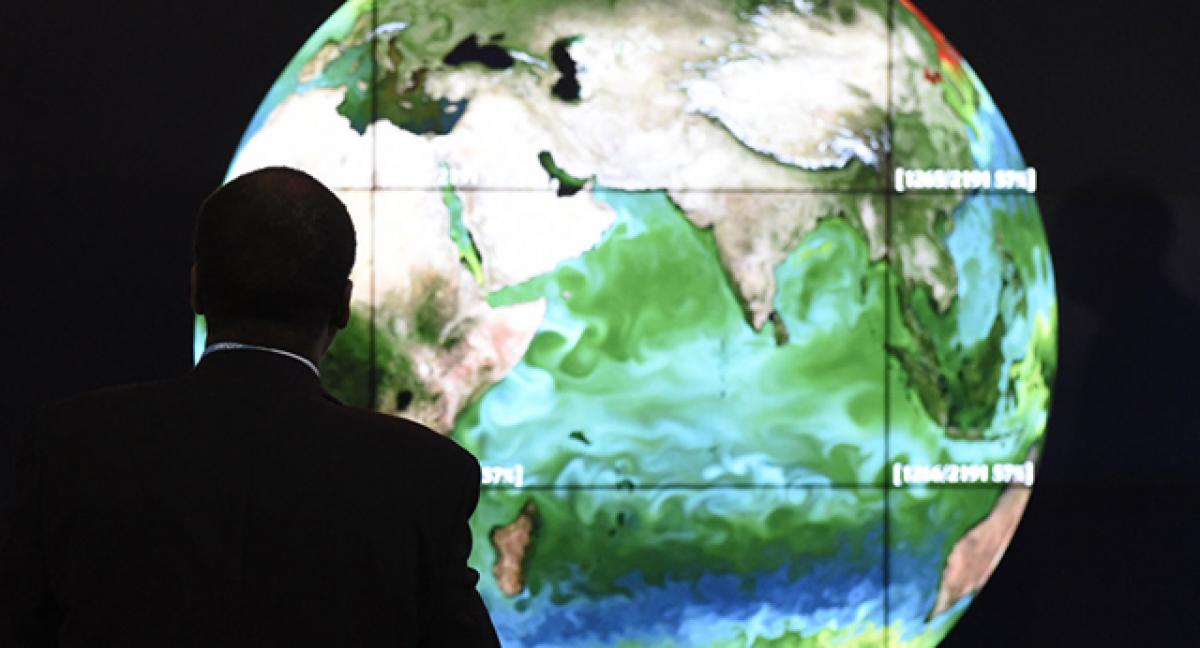Live
- TGSPDCL deploys 101 ERT vehicles
- JIH to host national conclave in city
- OU celebrates National Library Week with book exhibition
- Prakash Utsav to be celebrated today
- Survey staff turn a blind eye towards apartment dwellers
- Assembly to resolve on Constitutional amendment on age limit for legislators
- Govt to hold three public meetings for ‘People’s Govt—Victory Celebrations’
- SBI staff’s presence of mind averts digital arrest scam
- Students of Rockwoods School showcase unity in diversity
- Minister demands establishment of regional Centre of Excellence
Just In
Emerging economies seek clarity on climate finance in Paris agreement

10 Dec 2015 7:42 PM IST

x
Highlights
A group of advanced developing countries call for transparency around climate finance for a robust climate deal in Paris.

A group of advanced developing countries call for transparency around climate finance for a robust climate deal in Paris. Finance continues to be a key issue in the current round of talks.
At a press conference on the sidelines of the climate negotiations in Paris ministers of a group of emerging economies — Brazil, South Africa, India and China — stressed the importance for transparency on the issue of climate finance.
The ministers of the four countries, called BASIC,outlined that ensuring differential obligations and treatment between developed and developing countries was paramount to an effective agreement. “The ambition and effectiveness of the agreement will be underpinned by operationalising differentiation between developed and developing countries in each element”, said the ministers in their joint statement.
The issue of differentiation also determines the fate of other items on the platter, like finance and transparency.
The debate on differentiation between developed and developing countries are one of the core contentious issues that need to be resolved for an effective agreement in Paris. The French presidency set up a ministerial facilitating group headed by two ministers, one of whom is Brazil's environment minister Izabella Teixeira, to resolve some the red lines. India is batting hard to keep the debate alive.
"Paris agreement that we are negotiating has to be under Convention. The new agreement must respect the principles of the convention, in particular that of common but differentiated responsibility. There is no question of diluting these principles," said Indian environment minister Prakash Javadekar.
South African minister Edna Molewa assured that the emerging economies would remain flexible and cooperative in the negotiations. She also reminded that the agreement to be reached in Paris is the outcome of Durban mandate which states that "the principles of the convention, in particular common but differentiated responsibilities, will be adhered to."
Molewa added that the 196-strong countries have not gathered in Paris to “rewrite the Convention”.
She was joined by Javadekar who said the fundamental aim of this agreement is for enhancement and implementation of convention. The BASIC ministers reiterated that the obligation to provide climate finance rests with the industrialised countries.
"Actions by the developing world will, to a great extent, depend on finance and technology from developed countries. Because the industrialised countries have the capabilities and developing countries don't. The haves will provide the have-nots." The group is disappointed with the “low level of climate ambition and support provided by developed countries”, the Indian minister said.
XieZhenhua, the Chinese minister urged developed countries to "implement their obligations" on providing climate finance. “When it comes to climate fund, the more the better. I hope the developed countries scale up the funds”, Zhenhua said. New agreement cannot be limited to mitigation alone and must equally emphasise on adaptation and support.
On the other hand, the European Union and the United States upped the ante against India and China.
They claimed that the least developed and island nations were on its side on expanding donor base for climate finance and more “robust” review mechanism for climate action plans. One of the biggest negotiating groups, G-77 and China, hit back saying that the developed countries need to fulfil their commitment on climate finance before putting new conditions on climate finance.
The US and Europe are trying to use expansion of donor base and climate finance only for poorest of the poor countries to create a wedge among the developing countries saying it will result in more money for them.
By Avik Roy
The author is a New Delhi-based journalist who is currently in Paris to cover COP21.

Next Story
More Stories
ADVERTISEMENT
© 2024 Hyderabad Media House Limited/The Hans India. All rights reserved. Powered by hocalwire.com






